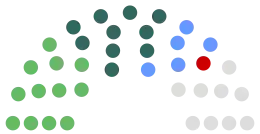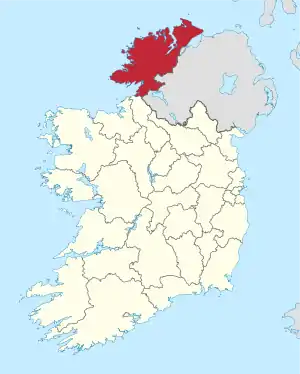Donegal County Council
Donegal County Council (Irish: Comhairle Contae Dhún na nGall) is the authority responsible for local government in County Donegal, Ireland. As a county council, it is governed by the Local Government Act 2001. The council is responsible for housing and community, roads and transportation, urban planning and development, amenity and culture, and environment. It has 37 elected members. Elections are held every five years and are by single transferable vote. The head of the council has the title of Cathaoirleach (Chairperson). The county administration is headed by a Chief Executive, Séamus Neely. The county town is Lifford.
Donegal County Council Comhairle Contae Dhún na nGall | |
|---|---|
 | |
| Type | |
| Type | |
| Leadership | |
Rena Donaghey, FF | |
| Structure | |
| Seats | 37 |
 | |
Political groups |
|
| Elections | |
Last election | 24 May 2019 |
| Motto | |
| Mutuam habeatis caritatem (Latin) "Maintain among you mutual love and charity" | |
| Meeting place | |
.jpg.webp) | |
| County House, Lifford | |
| Website | |
| donegalcoco.ie | |

History
Donegal County Council, which had previously held its meetings in Lifford Courthouse,[1] acquired County House in Lifford for use as its meeting place and administrative headquarters in 1930.[2]
The d'Hondt method has been deployed by Donegal County Council since 2009 and has worked on all but Budget Day, leading Martin Harley (running mate of Joe McHugh at the 2020 general election) to suggest it be used to help form a government.[3]
Following the 2015 RTÉ programme Standards in Public Office, in March 2019, John O'Donnell was found by the Standards in Public Office Commission to have contravened the Local Government Act in three different instances, including failure to maintain proper standards of integrity, conduct and concern for the public interest.[4]
Local Electoral Areas and Municipal Districts
Donegal County Council is divided into the following municipal districts and local electoral areas, defined by electoral divisions.[5]
| Municipal District | LEA | Definition | Seats |
|---|---|---|---|
| Donegal | An Bhinn Bhán, An Leargaidh Mhór, Ballintra (in the former Rural District of Ballyshannon), Ballintra (in the former Rural District of Donegal), Ballyshannon Rural, Ballyshannon Urban, Bonnyglen, Bundoran Rural, Bundoran Urban, Carrickboy, Cavangarden, Cill Charthaigh, Cill Ghabhlaigh, Cliff, Clogher, Corkermore, Cró Chaorach, Crownarad, Donegal, Dunkineely, Eanymore, Gleann Cholm Cille, Grousehall, Haugh, Inver, Killybegs, Laghy, Loch Iascaigh, Málainn Bhig, Pettigoe, Tantallon, Tawnawully, Templecarn, Tieveskeelta and Tullynaught. | 6 | |
| Glenties | An Clochán Liath, An Craoslach, An Dúchoraidh, An Ghrafaidh, An Machaire, Anagaire, Árainn Mhór, Ard an Rátha, Ards, Baile na Finne, Caisleán na dTuath, Críoch na Sméar, Cró Bheithe, Dawros, Dún Fionnachaidh, Dún Lúiche, Gleann Gheis, Gleann Léithín, Gort an Choirce, Inis Caoil, Inis Mhic an Doirn, Leitir Mhic an Bhaird, Maas, Machaire Chlochair, Maol Mosóg, Mín an Chladaigh, Na Croisbhealaí and Na Gleannta. | 6 | |
| Inishowen | Buncrana | Birdstown, Buncrana Rural, Buncrana Urban, Burt, Castleforward, Desertegny, Fahan, Illies, Inch Island, Kilderry, Killea, Mintiaghs, Newtown Cunningham, Three Trees and Whitecastle. | 5 |
| Carndonagh | Ardmalin, Ballyliffin, Carndonagh, Carthage, Castlecary, Culdaff, Dunaff, Gleneely (in the former Rural District of Inishowen), Gleneganon, Glentogher, Greencastle, Malin, Moville, Redcastle, Straid, and Turmone | 4 | |
| Letterkenny–Milford | Letterkenny | Ballymacool, Castlewray, Corravaddy, Edenacarnan, Gortnavern, Killymasny, Kincraigy, Letterkenny Rural, Letterkenny Urban, Magheraboy, Manorcunningham, Mín an Lábáin, Suí Corr and Templedouglas. | 7 |
| Milford | An Cheathrú Chaol, An Tearmann, Ballyarr, Carraig Airt, Cnoc Colbha, Creamhghort, Fánaid Thiar, Fánaid Thuaidh, Gartán, Glen, Glenalla, Grianfort, Killygarvan, Kilmacrenan, Loch Caol, Millford, Rathmelton, Rathmullan, Ros Goill and Rosnakill. | 3 | |
| Lifford–Stranorlar | Allt na Péiste, An Clochán, Castlefinn, Cloghard, Clonleigh North, Clonleigh South, Convoy, Dooish, Feddyglass, Figart, Gleneely (in the former Rural District of Stranorlar), Goland, Killygordon, Knock, Lettermore, Mín Charraigeach, Raphoe, St. Johnstown, Stranorlar, Treantaghmucklagh and Urney West. | 6 | |
Current councillors
The following were elected at the 2019 Donegal County Council election, under the boundaries which existed at the time.
| Party | Seats | |
|---|---|---|
| Fianna Fáil | 12 | |
| Sinn Féin | 10 | |
| Fine Gael | 6 | |
| Labour Party | 1 | |
| Independent | 8 | |
Councillors by electoral area
This list reflects the order in which councillors were elected on 24 May 2019.[6]
| Council members from 2019 election | |||
|---|---|---|---|
| Local electoral area | Name | Party | |
| Buncrana | Paul Canning | Fianna Fáil | |
| Rena Donaghey | Fianna Fáil | ||
| Jack Murray | Sinn Féin | ||
| Nicholas Crossan | Independent | ||
| Terry Crossan | Sinn Féin | ||
| Carndonagh | Martin McDermott | Fianna Fáil | |
| Martin Farren | Labour | ||
| Albert Doherty | Sinn Féin | ||
| Bernard McGuinness | Fine Gael | ||
| Donegal | Niamh Kennedy | Independent | |
| Noel Jordan | Sinn Féin | ||
| Micheál Naughton | Fianna Fáil | ||
| Barry Sweeny | Fine Gael | ||
| Tom Conaghan | Independent | ||
| Michael McMahon | Sinn Féin | ||
| Glenties | Micheál Choilm Mac Giolla Easbuig | Independent | |
| John Sheamuis Ó Fearraigh | Sinn Féin | ||
| Máire Therese Gallagher | Sinn Féin | ||
| Noreen McGarvey | Fianna Fáil | ||
| Michael McClafferty | Fine Gael | ||
| Anthony Molloy | Fianna Fáil | ||
| Letterkenny | Ciaran Brogan | Fianna Fáil | |
| Jimmy Kavanagh | Fine Gael | ||
| Michael McBride | Independent | ||
| Dónal Coyle | Fianna Fáil | ||
| Kevin Bradley | Independent | ||
| Manus Kelly[lower-alpha 1] | Fianna Fáil | ||
| Gerry McMonagle | Sinn Féin | ||
| Lifford–Stranorlar | Martin Harley | Fine Gael | |
| Patrick McGowan | Fianna Fáil | ||
| Gary Doherty | Sinn Féin | ||
| Gerry Crawford | Fianna Fáil | ||
| Frank McBrearty Jnr | Fine Gael | ||
| Liam Doherty | Sinn Féin | ||
| Milford | John O'Donnell | Independent | |
| Liam Blaney | Fianna Fáil | ||
| Ian McGarvey | Independent | ||
- Notes
- Replaced during term, see table below for details.
Co-options
| Party | Outgoing | Electoral area | Reason | Date | Co-optee | |
|---|---|---|---|---|---|---|
| Fianna Fáil | Manus Kelly | Letterkenny | Death of councillor | June 2019 | Donal Kelly | |
References
- "Establishment of Donegal County Council". Donegal County Council. Retrieved 31 October 2019.
- "Local Authorities". Oireachtas. 26 May 1982. Retrieved 26 October 2019.
- Walsh, Harry (20 February 2020). "Harley says d'Hondt method could be used to form new government". Donegal News. p. 5.
- Kelly, Fiach (26 March 2019). "Sipo finds against two councillors over RTÉ undercover report". The Irish Times. Retrieved 26 March 2019.
- "S.I. No. 613/2018 - County of Donegal Local Electoral Areas and Municipal Districts Order 2018". 19 December 2018. Retrieved 30 January 2019.
- "Local Elections 2014: Results" (PDF). Department of Housing, Planning and Local Government. p. 102. Retrieved 31 January 2019.